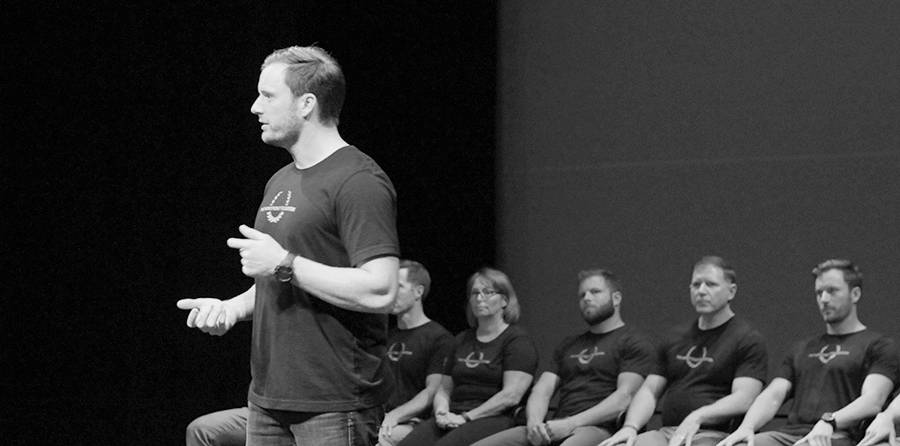Your Tale, Your Well-Being: Unlocking the Healing Power of Storytelling

A former Green Beret, who was the lone survivor of an IED attack, described the guilt he felt.
A Tampa Police Officer shared a story of his experience when two of his fellow officers were shot and killed at a routine traffic stop.
A flight medic expressed an ethical dilemma he faced: honor a burn victim’s plea with him not to be sedated as he was afraid he’d never wake up again or sedate him knowing it was the only way he could see his family again.
This past weekend, I had the privilege to empower a group of eleven veterans, service members, and first responders through storytelling. I worked alongside Matt Fetterman, a Navy veteran and former Columbia Organizational Psychology, Change Leadership Master’s Program participant, who with his twin brother, Mark, cofounded The Homefront Foundation, Inc., a nonprofit organization.
The Homefront Foundation teaches veterans, service members, and first responders how to tell stories in hopes that by doing so they can reconnect with their communities, their jobs, and most importantly, their families.
When Matt shared his mission and vision with me, I was inspired to help him find a way forward to make it happen – no part of me hesitated to volunteer a day to teach these men and women storytelling skills. Like many of us, I have my own connections to veterans and first responders. My grandfather, Edward, was killed in action in World War II. My father, uncles, and cousins served and returned home. On September 11, I lost a dear friend (Henry Miller, a firefighter who was stationed at Dean Street, right in the heart of Brooklyn) in the attacks. I keep Henry’s Dean Street Ladder 105 memorial shirt with me and use it as a way to tell his story, and the story of my cousin, Scott Cowan (FDNY), who worked rescue and recovery operations at Ground Zero.
Throughout the day, eleven incredible participants – men and women, from the Army, Navy, Air Force, and Marine Corps, as well as a fire chief, police officer, and a flight medic – learned the art of storytelling. Unlike most sessions I’ve done, the primary purpose for telling these personal stories wasn’t to motivate or inspire others in a business setting towards a desired business outcome; rather, these participants were using stories to create a bridge, spark healing, and reintegrate into their communities.
How Can Stories Heal?
One of my favorite sayings that I use when I coach storytelling skills is “what would happen if…”
What would happen if you took a breath before going to the next section?
What would happen if you tried sitting down before you started your story?
What would happen if you were more expressive and re-enacted “picking up the bag”?
Before we met, I’m sure the participants struggled with this single question:
What would happen if I told my story?
The eleven participants I worked with had joined occupations that see and experience unimaginable situations. They have invisible wounds from their experiences. Many, like the generations before them, choose to suffer in silence, afraid to let anyone see their emotions. And now Matt and Mark had asked the understandably skeptical crowd to share their stories, publicly.
I knew the cathartic release the participants would feel by exploring these emotional wounds again through storytelling. All I could do was what I always do: listen, empathize, and coach.
At the Ariel Group, we have a simple formula to help our participants:
- First, empathize and endorse what’s working
- Ask what they think they can work on
- Coach to have them work on it
Storytelling is a process and it enables you to truly connect with your audience. When your eyes meet another’s, you can feel the palpable connection between two people. These stories are powerful – and personal – to each participant. These stories are a testament to the resilience of their spirit and the fortitude of the American people.
Final Thoughts
These soldiers, sailors, Marines, and first responders share a sense of responsibility, and remarkable strength – but it may not be the strength you expect. A former Navy SEAL noted how much he idolized “strength and resiliency” and saw those who couldn’t make it through training as “weak.” In that mindset, weakness was not being able to get through the simulation. Weakness was not volunteering for another deployment. Weakness was even sleep. But when his close friend and fellow SEAL committed suicide, his whole belief system shattered. Along with his fellow participants, he ultimately realized:
Asking to speak with someone to navigate the tragedy you went through isn’t weak.
Saying you feel isolated isn’t weak.
Sometimes, it takes incredible strength to share your feelings, and ask for help. That strength helps you tell your story, and can lift even the heaviest burden off your shoulders.
The Ariel Group is proud to share the Homefront Foundation’s mission to call up that strength and help healing for these participants and their peers.
To learn more about our partnership with The Homefront Foundation, go here.
